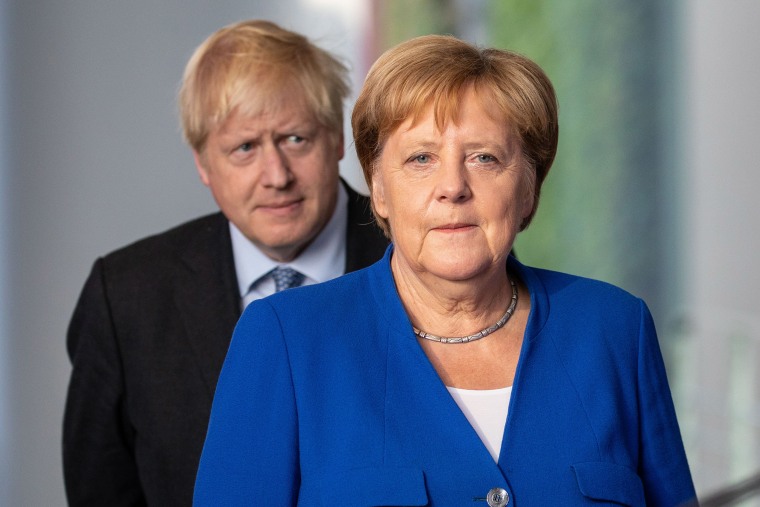BERLIN — British Prime Minister Boris Johnson was told he's in need of a miracle as he took his appeal to reopen Brexit negotiations with the European Union to unwavering French President Emmanuel Macron on Thursday.
The bloc's proposition of the so-called Irish backstop — a plan to maintain an open border between Northern Ireland and Ireland after Brexit — was an "indispensable" component of the existing agreement, Macron said after having called Johnson's demand to renegotiate the divorce deal not workable.
"We have to respect what was negotiated," he said upon Johnson's arrival to the Elysee Palace, emphasizing the need for stability between Northern Ireland, which is part of Britain, and the Republic of Ireland, an independent country that is also a member of the E.U.
Macron's warning comes one day after German Chancellor Angela Merkel challenged Britain to come up with a solution to the biggest obstacle to a deal — the current 310-mile seamless border — in the next 30 days.
In the past, border checkpoints between E.U. member Ireland and U.K. member Northern Ireland have been a flashpoint for sectarian violence.
That was seen by British officials as a sign that the E.U. may end its refusal to discuss changes to an existing exit deal, which has been rejected by Britain's parliament three times.
But Luxembourg's Foreign Minister Jean Asselborn said on Thursday a solution to the Irish border problem would need a miracle.
"Miracles should never be ruled out, but I'm skeptical we can simply pluck something out of the air that guarantees Ireland has no hard border and at the same time the E.U. has control over what enters its market," he told German broadcaster SWR.
"I'm not convinced that we can for sure say today a no-deal Brexit is coming, but we must clearly outline the dangers of a no-deal Brexit and Boris Johnson should do so too," he added.
A group of U.S. legislators also weighed in on the Irish problem in a letter to Johnson on Thursday.
Any trade deal with the U.S. is "highly unlikely" if the 1998 Good Friday Agreement — which ended 30 years of conflict between on the island — is weakened, wrote the Congressional Friends of Ireland, a group in the U.S. Congress which promotes peace and reconciliation in Northern Ireland.
The letter warns that the peace process is "still fragile and needs to be nurtured."
Macron warned ahead of their meeting, adding that Britain risked being subordinated by the United States if it crashed out of the bloc on Oct. 31.
"The British are attached to being a great power," Macron said on Wednesday. "The point can't be to exit Europe and say 'we'll be stronger,' before in the end, becoming the junior partner of the United States, which are acting more and more hegemonically."
Macron said he saw no reason to grant a further delay to Brexit unless there was a significant political change in Britain, such as an election or a new referendum.
More than three years since the United Kingdom voted to quit the European Union, it is still unclear on what terms — or indeed whether — the bloc's second largest economy will leave the club it joined in 1973.

Johnson has spent his first month in office promising to leave the E.U. even if he is unable to negotiate an exit deal to dampen the impact of the split between the world's fifth largest economy and its closest trading partner.
Having persuaded many in European capitals the threat of a so-called no deal exit is real, he is this week making his first attempts to sound out what sort of a deal could be on offer and whether it is something he can sell to lawmakers at home
Macron further underscored the E.U.'s position that there would be no reopening of the Withdrawal Agreement agreed between Johnson's predecessor Theresa May and the bloc.
An official in Macron's office said France now saw a no-deal as the most likely scenario come and that there was not a "cigarette paper" standing between the positions of France, Germany and other E.U. states.


